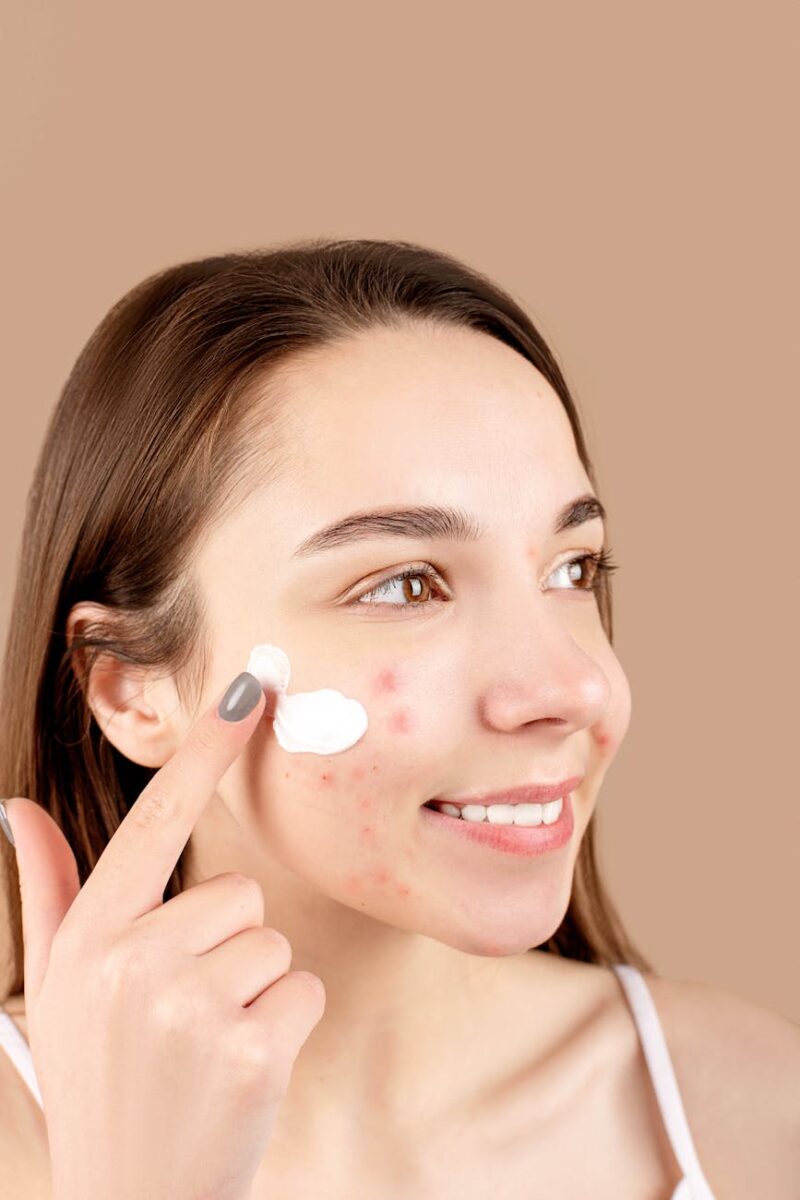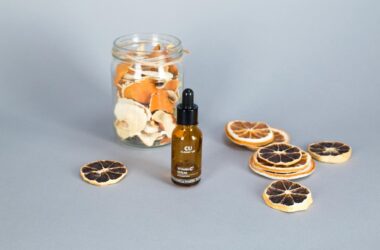Hyaluronic acid gives volume to the skin, creating an apparent “fuller” look.
Hyaluronic acid is naturally present in our bodies where it binds water molecules and lubricates the joints — but when we age, our body’s ability to produce this acid decreases.
As a result, skin loses its volume and elasticity. When applied topically, hyaluronic acid makes fine lines appear smaller and undereye puffiness less dramatic.
This article discusses whether hyaluronic acid is safe for sensitive skin — or if people with sensitive skin should even be using it.
Table of Contents
- Is Hyaluronic Acid Safe for Sensitive Skin?
- How to Use Hyaluronic Acid for Your Sensitive Skin
- Benefits of Using Hyaluronic Acid on Your Sensitive Skin
- Side Effects of Using Hyaluronic Acid on Sensitive Skin
- How to Know if Hyaluronic Acid Is Right for You
- How Much Hyaluronic Acid Should You Use if You Have Sensitive Skin?
- Does Hyaluronic Acid Irritate Sensitive Skin?
- What Is the Best Night Cream With Hyaluronic Acid for Sensitive Skin?
- Final Thoughts
Is Hyaluronic Acid Safe for Sensitive Skin?
If you have sensitive skin, you might be wary of adding another ingredient to your routine. But hyaluronic acid is gentle enough to use even if you have sensitive skin.
In fact, it’s often recommended as a moisturizer for those with acne or redness.
It’s also safe to use if you’re taking Accutane, an acne medication that can cause dryness and irritation.
How to Use Hyaluronic Acid for Your Sensitive Skin
Hyaluronic acid is generally recommended for normal and dry skin since it helps retain water and moisture in the upper layers of the skin.
However, even those with sensitive skin can use hyaluronic acid provided they follow a few simple guidelines to prevent an adverse reaction.
1. Choose a low molecular weight version of hyaluronic acid
The molecular weight of hyaluronic acid refers to the size of the molecules.
The smaller the size, the easier it is for the ingredient to penetrate into deeper layers of your skin.
If you have sensitive skin, choose a product containing low molecular weight hyaluronic acid since this will be less likely to cause an adverse reaction on your skin.
2. Make sure your product contains no additional ingredients
Some products contain hyaluronic acid in combination with other ingredients such as vitamin C or retinol.
These ingredients are more likely to irritate sensitive skin.
3. Use it as a spot treatment
Hyaluronic acid can be used as a targeted spot treatment, too, so if you want to focus your application on drier patches of skin, use only where needed and apply your regular moisturizer elsewhere.
4. Apply at night only
Because hyaluronic acid can make the skin more sun-sensitive, it’s best to apply it at night rather than during the day when you’ll be outside for long periods of time.
5. Limit use to once a day
If you have dry skin, using hyaluronic acid twice per day might be beneficial for you, but for those with sensitive skin who are looking to avoid irritation, try once per day and see how that works for you before increasing the frequency of application.
6. Go for a hyaluronic acid serum over a cream or moisturizer
A hyaluronic acid serum is water-based, so it’ll be less likely to cause irritation (especially if you’re acne-prone).
It usually has fewer ingredients than a cream or moisturizer, making it less likely to clog pores and cause breakouts.
Benefits of Using Hyaluronic Acid on Your Sensitive Skin
Many skin care products contain hyaluronic acid as an ingredient and using them can be beneficial in many ways. Here are 10 benefits of using hyaluronic acid on your sensitive skin:
- It helps in retaining moisture in the skin
- It has anti-aging benefits
- It is helpful for wound healing
- It is good for dry eyes
- It is a good moisturizer for dry skin
- It helps in treating sunburns
- It may help to reduce joint pain
- It prevents hair loss
- It reduces irritation caused by shaving, waxing, and laser treatment
- Hyaluronic acid may help to treat eczema
Side Effects of Using Hyaluronic Acid on Sensitive Skin
Hyaluronic acid is safe to use on sensitive skin. In fact, if you have sensitive skin, then hyaluronic acid is an excellent choice for you.
The reason why it’s so great is that it’s naturally occurring in our bodies and works by attracting water to the skin cells, making it a fabulous moisturizing ingredient.
The only time I would avoid this ingredient is if you are allergic or sensitive to hyaluronic acid itself!
How to Know if Hyaluronic Acid Is Right for You
But is hyaluronic acid right for your skin? Here are some signs you could benefit from adding this ingredient to your skincare routine:
1. Your skin needs more moisture.
2. You have dry skin and need a product that will help keep it hydrated.
3. Your skin tends to feel tight after washing or when exposed to harsh elements like the sun or wind.
4. You want to add an extra layer of protection against environmental aggressors like pollution and UV rays, which can lead to premature aging of the skin.
5. You want to reduce the appearance of fine lines and wrinkles without using retinol (which can be too harsh for some).
6. You have sensitive skin. Hyaluronic acid has very few side effects, which means that it is safe to use on sensitive skin. In fact, many doctors recommend it for people with sensitive skin because it moisturizes without causing irritation or redness.
How Much Hyaluronic Acid Should You Use if You Have Sensitive Skin?
The amount of hyaluronic acid (HA) that you need is dependent on your skin condition. For sensitive skin, it is important to start with a small amount and build up slowly.
You need to find the right amount of HA that will have a noticeable improvement on your skin without causing irritation. It is also important to use only the pure HA form and stay away from those HA products containing fragrance and other irritating ingredients.
The best way to get started is to use a serum containing a low concentration of 0.1% hyaluronic acid, apply a small amount first and observe your skin’s reaction.
As long as your skin does not get irritated, you can continue using it daily for about two weeks before increasing the frequency of the application or increasing the concentration of the HA serum.
A good indication that your skin can tolerate higher concentrations of HA is when it no longer feels sticky after applying an HA serum or cream.
If this happens, try changing to an HA serum or cream containing 0.2% or higher concentration of hyaluronic acid every other day until your skin can tolerate daily use of the product.
Does Hyaluronic Acid Irritate Sensitive Skin?
Hyaluronic acid is often recommended for the treatment of dry skin because it helps the skin retain moisture. However, it can also cause irritation in people with sensitive skin.
If you have sensitive skin, you should test any new product on a small patch of skin before using it extensively.
You might want to look for a product that includes hyaluronic acid as an ingredient rather than one that contains only hyaluronic acid.
What Is the Best Night Cream With Hyaluronic Acid for Sensitive Skin?
The best night cream with hyaluronic acid for sensitive skin is the Paula’s Choice Skin Recovery Replenishing Moisturizer.
But if you have sensitive skin, how do you pick a night cream that won’t irritate your face or cause breakouts? One of the best ingredients to look for in a night cream with hyaluronic acid for sensitive skin is ceramides.
According to dermatologists, “Ceramide-containing products are often recommended for patients with eczema and dry skin because they help to retain water and strengthen the skin barrier”.
The Paula’s Choice night cream contains ceramides and has been independently tested and reviewed by editors at Harper’s Bazaar UK who said it “wasn’t irritating [and] left our tester’s dry skin soft and comfortable”.
It has also been recommended by Allure magazine as one of the best “moisturizers that leave sensitive skin hydrated and supple”.
Final Thoughts
Ultimately, the verdict is that hyaluronic acid is indeed safe for sensitive skin.
Of course, it’s always a good idea to get a test patch on your skin before using any beauty product or treatment, but if you felt fine using the product during that time, then you can safely assume that you’ll probably be fine using it long term.







